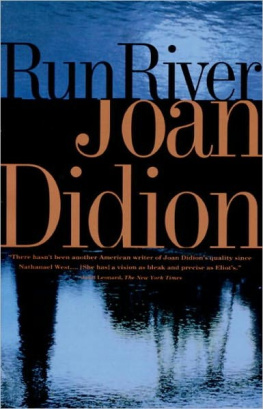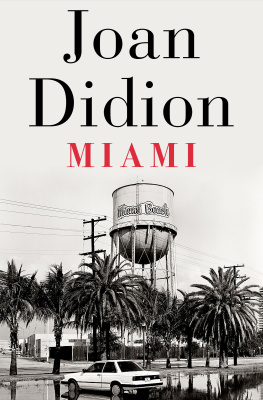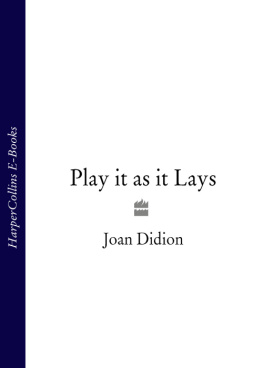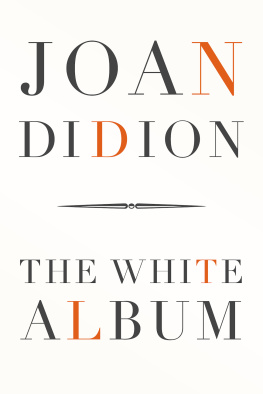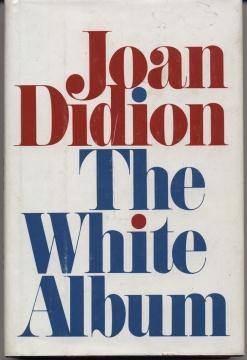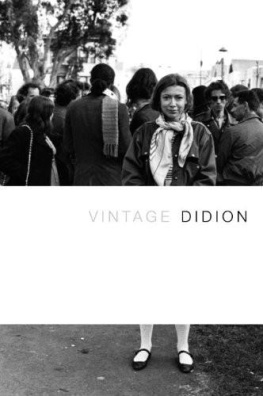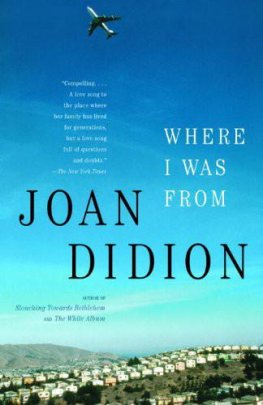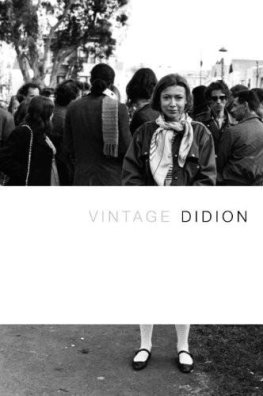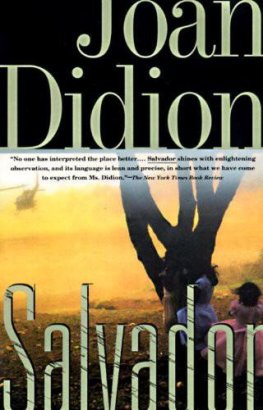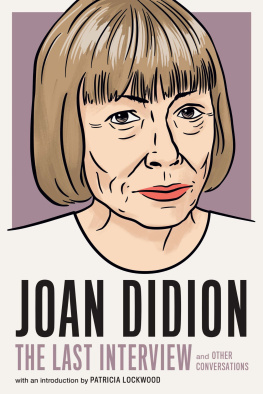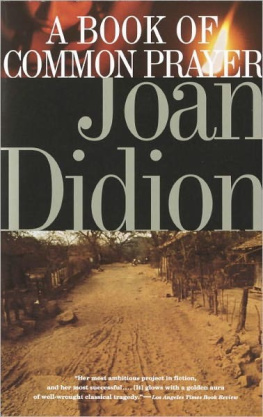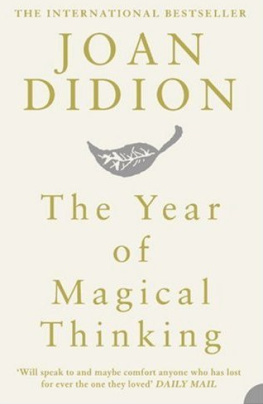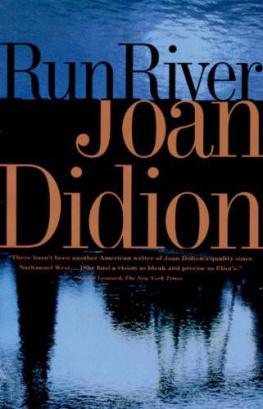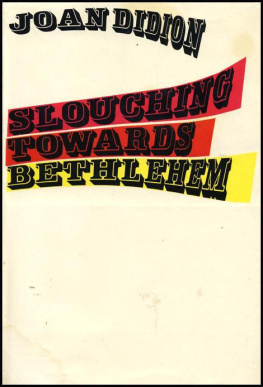DIDION - Where I Was From
Here you can read online DIDION - Where I Was From full text of the book (entire story) in english for free. Download pdf and epub, get meaning, cover and reviews about this ebook. year: 2011, publisher: Knopf Doubleday Publishing Group, genre: Non-fiction. Description of the work, (preface) as well as reviews are available. Best literature library LitArk.com created for fans of good reading and offers a wide selection of genres:
Romance novel
Science fiction
Adventure
Detective
Science
History
Home and family
Prose
Art
Politics
Computer
Non-fiction
Religion
Business
Children
Humor
Choose a favorite category and find really read worthwhile books. Enjoy immersion in the world of imagination, feel the emotions of the characters or learn something new for yourself, make an fascinating discovery.

- Book:Where I Was From
- Author:
- Publisher:Knopf Doubleday Publishing Group
- Genre:
- Year:2011
- Rating:3 / 5
- Favourites:Add to favourites
- Your mark:
- 60
- 1
- 2
- 3
- 4
- 5
Where I Was From: summary, description and annotation
We offer to read an annotation, description, summary or preface (depends on what the author of the book "Where I Was From" wrote himself). If you haven't found the necessary information about the book — write in the comments, we will try to find it.
Where I Was From — read online for free the complete book (whole text) full work
Below is the text of the book, divided by pages. System saving the place of the last page read, allows you to conveniently read the book "Where I Was From" online for free, without having to search again every time where you left off. Put a bookmark, and you can go to the page where you finished reading at any time.
Font size:
Interval:
Bookmark:
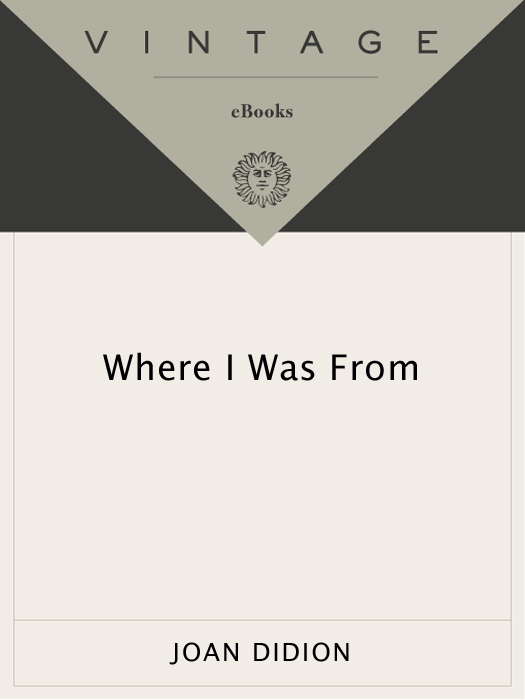
Acclaim for Joan Didions
Where I Was From
[Didions is] one of the most recognizableand brilliant literary styles to emerge in America during the past four decades. [She is] a great American writer.
The New York Times Book Review
Didion has written a brave little book a fine book that must be read with as much care as it was written. [Didion is] an implacably honest writer.
Jonathan Yardley, The Washington Post
Valediction and elegy alike, Where I Was From is a storm-tossed book. Its history is dense its prose sharp, direct and chiseled.
Los Angeles Times Book Review
Eloquent, spare, and rendered without sentiment.
The Boston Globe
[Didion is] a latter-day Walt Whitman, singing of America by singing of herself.
Slate
Joan Didion is a brilliant explicator of the American political and cultural consciousness.
Rocky Mountain News
Many of us have tried, and failed, to master [Didions] gift for the single ordinary deflating word, the word that spins an otherwise flat sentence through five degrees of irony. But her sentences could only be hers.
Michael Gorra, Chicago Tribune
[A] fascinating, informative, obscureand yes, movinglittle book.
San Jose Mercury News
A bracing mix of personal and public history.
Benjamin Kunkel, Newsday
Odd, elliptical and ultimately revealing. Didion discovers the exact locus where geography and personal journey intersect, and has produced a work as compelling and enigmatic as its subjects.
Time Out New York
Where I Was From is a beautifully written and intensely personal tome. One of the countrys most intelligent writers Ms. Didions prose is like a razor cutting straight to the bone.
New York Sun
[Didions] appraisal is cool, her eye is sharp, and her turn of phrase is wicked.
Time
How odd that bad news can be so much fun to read. Her essays are as sinewy as her novels, written in the same ice-pick/laser-beam prose.
Harpers
Joan Didion was born in California and lives in New York City. She is the author of five novels and seven previous books of nonfiction, including The Year of Magical Thinking. Her collected nonfiction, We Tell Ourselves Stories in Order to Live, was published by Everymans Library in September 2006.
B OOKS BY J OAN D IDION
W E T ELL O URSELVES S TORIES IN O RDER TO L IVE
T HE Y EAR OF M AGICAL T HINKING
W HERE I W AS F ROM
P OLITICAL F ICTIONS
T HE L AST T HING H E W ANTED
A FTER H ENRY
M IAMI
D EMOCRACY
S ALVADOR
T HE W HITE A LBUM
A B OOK OF C OMMON P RAYER
P LAY I T AS I T L AYS
S LOUCHING T OWARDS B ETHLEHEM
R UN R IVER
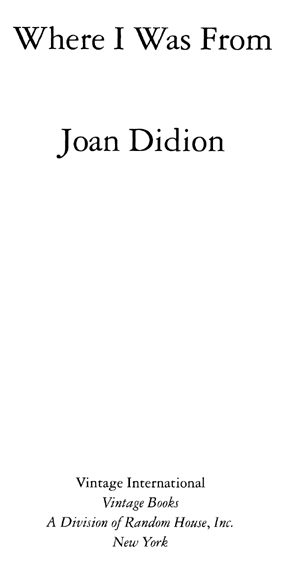
This book is for my brother
James Jerrett Didion,
and for our mother and father,
Eduene Jerrett Didion
and
Frank Reese Didion,
with love
M Y great-great-great-great-great-grandmother Elizabeth Scott was born in 1766, grew up on the Virginia and Carolina frontiers, at age sixteen married an eighteen-year-old veteran of the Revolution and the Cherokee expeditions named Benjamin Hardin IV, moved with him into Tennessee and Kentucky and died on still another frontier, the Oil Trough Bottom on the south bank of the White River in what is now Arkansas but was then Missouri Territory. Elizabeth Scott Hardin was remembered to have hidden in a cave with her children (there were said to have been eleven, only eight of which got recorded) during Indian fighting, and to have been so strong a swimmer that she could ford a river in flood with an infant in her arms. Either in her defense or for reasons of his own, her husband was said to have killed, not counting English soldiers or Cherokees, ten men. This may be true or it may be, in a local oral tradition inclined to stories that turn on decisive gestures, embroidery. I have it on the word of a cousin who researched the matter that the husband, our great-great-great-great-greatgrandfather, appears in the standard printed histories of Arkansas as Old Colonel Ben Hardin, the hero of so many Indian wars. Elizabeth Scott Hardin had bright blue eyes and sick headaches. The White River on which she lived was the same White River on which, a century and a half later, James McDougal would locate his failed Whitewater development. This is a country at some level not as big as we like to say it is.
I know nothing else about Elizabeth Scott Hardin, but I have her recipe for corn bread, and also for India relish: her granddaughter brought these recipes west in 1846, traveling with the Donner-Reed party as far as the Humboldt Sink before cutting north for Oregon, where her husband, the Reverend Josephus Adamson Cornwall, was determined to be the first Cumberland Presbyterian circuit rider in what was then called Oregon country. Because that granddaughter, Nancy Hardin Cornwall, was my great-great-great-grandmother, I have, besides her recipes, a piece of appliqu she made on the crossing. This appliqu, green and red calico on a muslin field, hangs now in my dining room in New York and hung before that in the living room of a house I had on the Pacific Ocean.
I also have a photograph of the stone marker placed on the site of the cabin in which Nancy Hardin Cornwall and her family spent the winter of 184647, still short of their destination in the Willamette Valley but unable to get their wagons through a steep defile on the Umpqua River without abandoning Josephus Cornwalls books. (This option seems to have presented itself only to his daughters.) Dedicated to the memory of Rev. J. A. Cornwall and family, the engraving on the marker reads. They built the first immigrant cabin in Douglas County near this site, hence the name Cabin Creek. The family wintered here in 18461847, were saved from extreme want by Israel Stoley, a nephew who was a good hunter. The Indians were friendly. The Cornwalls traveled part way westward with the ill-fated Donner Party.
My mother was sent the photograph of this marker by her mothers cousin Oliver Huston, a family historian so ardent that as recently as 1957 he was alerting descendants to an occasion which no heir should miss, the presentation to the Pacific University Museum of, among other artifacts, the old potato masher which the Cornwall family brought across the plains in 1846. Oliver Hustons letter continued: By this procedure, such items can then be seen by all Geiger and Cornwall heirs at any time in the future by simply visiting the Museum. I have not myself found occasion to visit the potato masher, but I do have a typescript of certain memories, elicited from one of Nancy Hardin Cornwalls twelve children, Narcissa, of those months on what would later be called Cabin Creek:
We were about ten miles from the Umpqua River and the Indians living there would come and spend the greater part of the day. There was one who spoke English, and he told Mother the Rogue River Indians were coming to kill us. Mother told them if they troubled us, in the spring the Bostons (the Indian name for the white people) would come out and kill them all off. Whether this had any effect or not I dont know, but anyway they did not kill us. But we always thought they would come one day for that purpose. One day Father was busy reading and did not notice the house was filling with strange Indians until Mother spoke about it. As soon as Father noticed them he got up and got his pistols and asked the Indians to go out and see him shoot. They followed him out, but kept at a distance. The pistols were a great curiosity to them. I doubt if they had ever seen any before. As soon as they were all out of the cabin Mother barred the door and would not let them in any more. Father entertained them outside until evening, when they got on their ponies and rode away. They never returned to trouble us any more.
Font size:
Interval:
Bookmark:
Similar books «Where I Was From»
Look at similar books to Where I Was From. We have selected literature similar in name and meaning in the hope of providing readers with more options to find new, interesting, not yet read works.
Discussion, reviews of the book Where I Was From and just readers' own opinions. Leave your comments, write what you think about the work, its meaning or the main characters. Specify what exactly you liked and what you didn't like, and why you think so.

